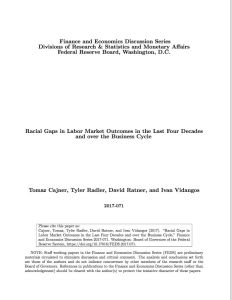Join getAbstract to access the summary!

Join getAbstract to access the summary!
Tomaz Cajner, Tyler Radler, David Ratner and Ivan Vidangos
Racial Gaps in Labor Market Outcomes in the Last Four Decades and over the Business Cycle
Federal Reserve Board, 2017
What's inside?
The Great Recession ended earlier for whites and Hispanics than it did for blacks.
Recommendation
Economic inequality has persisted in the United States for a very long time, and major disparities remain. Blacks and Hispanics experience the effects of economic downturns to a greater degree than other demographic groups, economists Tomaz Cajner, Tyler Radler, David Ratner and Ivan Vidangos explain in this technical analysis of job data spanning several decades. Their scholarly report offers no quick fixes, but it does recognize that, while identifying the problem may be one thing, rectifying it is another. getAbstract suggests this highly detailed and dense read to economists, hiring managers, analysts and policy experts.
Summary
About the Authors
Tomaz Cajner, Tyler Radler, David Ratner and Ivan Vidangos are with the Federal Reserve Board.



















Comment on this summary